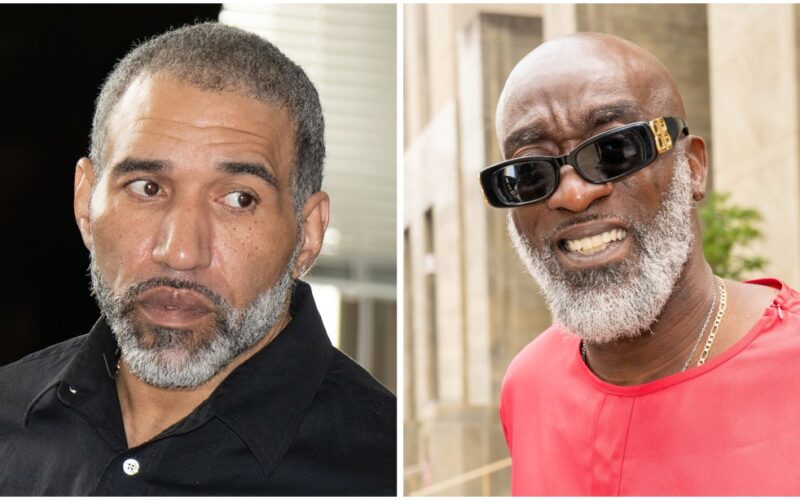Two men who were sent to prison for decades at 17 years old after NYPD officers pushed them to serve up false murder confessions saw their names cleared in Manhattan on Thursday.
Brian Boles and Charles Collins spent a combined 52 years behind bars for the murder of James Reid, an 85-year-old neighbor of Boles who was strangled to death inside his Harlem apartment on Feb. 8, 1994.
Neither teen had any connection to the killing outside of their confessions, which came after their arrests for an unrelated robbery that they admitted involvement in.
At a brief hearing, state Supreme Court Justice Ruth Pickholz granted joint motions from the Manhattan district attorney’s office, the Innocence Project, and the law firm Ropes & Gray to vacate Boles and Collins’s convictions and dismiss the underlying indictment.
The push to clear the two men of wrongdoing came after a reinvestigation determined that DNA recovered from Reid’s fingernails didn’t belong to Collins or Boles. Both the men’s lawyers and Manhattan DA Alvin Bragg said New York’s criminal justice system railroaded them in every way imaginable.
“Both Mr. Boles and Mr. Collins maintained their innocence since the moment they were arrested,” said Jane Pucher from the Innocence Project, which led Boles’s efforts to vacate his conviction.
“It was very clear, reviewing this record, that both of these young men had falsely confessed,” Pucher said of initially taking on the case. “Even just with what we knew then, there were huge factual inconsistencies between the nature of the crime and what the statements actually [said].”
Theodore Parisienne / New York Daily News
Brian Boles hugs his attorney, Jane Pucher, at Manhattan Criminal Court after his conviction was vacated on Thursday. (Theodore Parisienne / New York Daily News)
Collins and Boles, who had been staying at Boles’s place the night of the killing, were arrested for robbing another man a week later. During questioning, cops turned their focus to Reid’s killing, claiming to Boles that a neighbor had implicated him and later than Collins had as well. Neither was true.
Without a lawyer present, Boles, now 48, later balked and falsely confessed he and Collins had been involved in a taped confession cops later showed to Collins. The officers then extracted a false confession from Collins after showing him the tape. Collins is now 49.
Boles tried to recant his confession to no avail and was convicted at trial of second-degree murder and robbery, receiving a prison term of 20 years to life. He had served almost 30 years before his release on parole last year.
Collins took a plea deal and served 22 years, getting out on parole in 2017. Neither man wished to comment after Thursday’s hearing, with Boles telling reporters only that he was “feeling happy, feeling glad.”

Theodore Parisienne / New York Daily News
Brian Boles (right) and Charles Collins appear in Manhattan Criminal Court where their convictions were vacated on Thursday. (Theodore Parisienne / New York Daily News)
In addition to the newly recovered DNA, which Bragg said was retrievable due to technology advancements since 1994, the reinvestigation turned up exculpatory material that was never presented during Boles and Collins’s prosecutions, including documents showing witnesses saw Reid alive hours after the time Collins and Boles claimed the murder occurred.
It also found a lab report that debunked a detective’s testimony at Boles’s trial about the footwear impressions at the scene matching Collins’s boots.
At a press conference, Bragg said Collins and Boles’s wrongful convictions were devastating and that prosecutors had no leads on who Reid’s true killer was.
“Unjust convictions impact all of us because they harm public safety. When the wrong people are convicted, people or persons who committed the harm are not held accountable. That means victims and the public are left with questions unanswered,” Bragg said.
“It means people won’t come forward in other cases because they question, don’t trust the system, and that makes us all less safe.”
The DA said guardrails had been installed intended to prevent the same situation from reoccurring, including training for prosecutors on science-based interview techniques, more expansive forensic testing, videotaped interrogations, and other measures.
Bragg’s post-conviction justice unit, established in 2022, has moved to vacate 13 convictions, seven of them in homicide cases. It has moved to have more than 500 convictions tied to police officers accused of misconduct thrown out.








